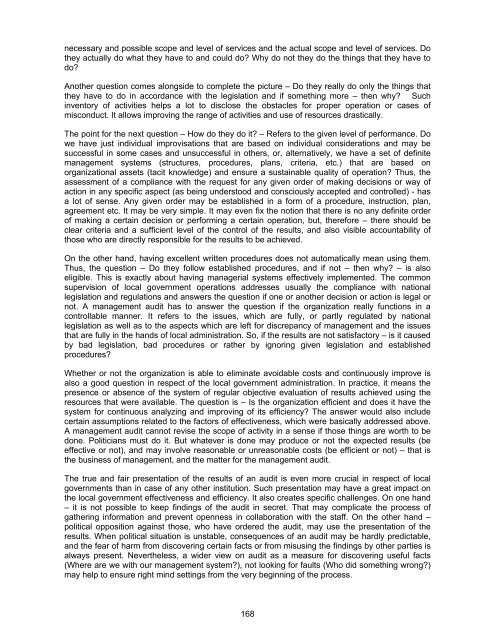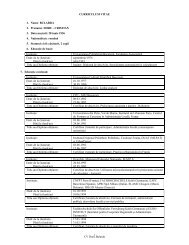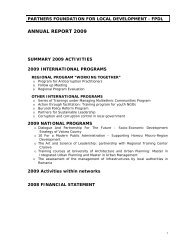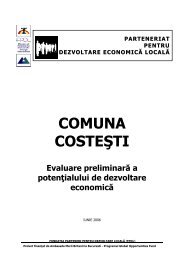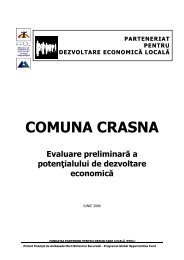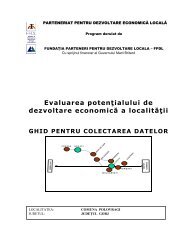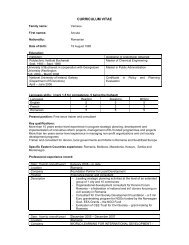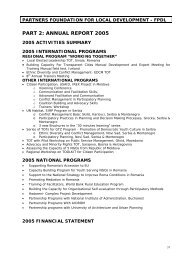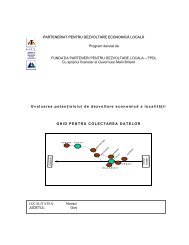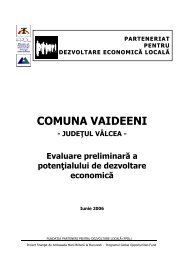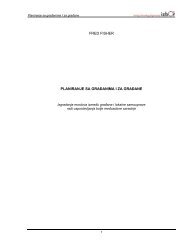Organizational Development: A Manual for Managers and ... - FPDL
Organizational Development: A Manual for Managers and ... - FPDL
Organizational Development: A Manual for Managers and ... - FPDL
Create successful ePaper yourself
Turn your PDF publications into a flip-book with our unique Google optimized e-Paper software.
necessary <strong>and</strong> possible scope <strong>and</strong> level of services <strong>and</strong> the actual scope <strong>and</strong> level of services. Do<br />
they actually do what they have to <strong>and</strong> could do? Why do not they do the things that they have to<br />
do?<br />
Another question comes alongside to complete the picture – Do they really do only the things that<br />
they have to do in accordance with the legislation <strong>and</strong> if something more – then why? Such<br />
inventory of activities helps a lot to disclose the obstacles <strong>for</strong> proper operation or cases of<br />
misconduct. It allows improving the range of activities <strong>and</strong> use of resources drastically.<br />
The point <strong>for</strong> the next question – How do they do it? – Refers to the given level of per<strong>for</strong>mance. Do<br />
we have just individual improvisations that are based on individual considerations <strong>and</strong> may be<br />
successful in some cases <strong>and</strong> unsuccessful in others, or, alternatively, we have a set of definite<br />
management systems (structures, procedures, plans, criteria, etc.) that are based on<br />
organizational assets (tacit knowledge) <strong>and</strong> ensure a sustainable quality of operation? Thus, the<br />
assessment of a compliance with the request <strong>for</strong> any given order of making decisions or way of<br />
action in any specific aspect (as being understood <strong>and</strong> consciously accepted <strong>and</strong> controlled) - has<br />
a lot of sense. Any given order may be established in a <strong>for</strong>m of a procedure, instruction, plan,<br />
agreement etc. It may be very simple. It may even fix the notion that there is no any definite order<br />
of making a certain decision or per<strong>for</strong>ming a certain operation, but, there<strong>for</strong>e – there should be<br />
clear criteria <strong>and</strong> a sufficient level of the control of the results, <strong>and</strong> also visible accountability of<br />
those who are directly responsible <strong>for</strong> the results to be achieved.<br />
On the other h<strong>and</strong>, having excellent written procedures does not automatically mean using them.<br />
Thus, the question – Do they follow established procedures, <strong>and</strong> if not – then why? – is also<br />
eligible. This is exactly about having managerial systems effectively implemented. The common<br />
supervision of local government operations addresses usually the compliance with national<br />
legislation <strong>and</strong> regulations <strong>and</strong> answers the question if one or another decision or action is legal or<br />
not. A management audit has to answer the question if the organization really functions in a<br />
controllable manner. It refers to the issues, which are fully, or partly regulated by national<br />
legislation as well as to the aspects which are left <strong>for</strong> discrepancy of management <strong>and</strong> the issues<br />
that are fully in the h<strong>and</strong>s of local administration. So, if the results are not satisfactory – is it caused<br />
by bad legislation, bad procedures or rather by ignoring given legislation <strong>and</strong> established<br />
procedures?<br />
Whether or not the organization is able to eliminate avoidable costs <strong>and</strong> continuously improve is<br />
also a good question in respect of the local government administration. In practice, it means the<br />
presence or absence of the system of regular objective evaluation of results achieved using the<br />
resources that were available. The question is – Is the organization efficient <strong>and</strong> does it have the<br />
system <strong>for</strong> continuous analyzing <strong>and</strong> improving of its efficiency? The answer would also include<br />
certain assumptions related to the factors of effectiveness, which were basically addressed above.<br />
A management audit cannot revise the scope of activity in a sense if those things are worth to be<br />
done. Politicians must do it. But whatever is done may produce or not the expected results (be<br />
effective or not), <strong>and</strong> may involve reasonable or unreasonable costs (be efficient or not) – that is<br />
the business of management, <strong>and</strong> the matter <strong>for</strong> the management audit.<br />
The true <strong>and</strong> fair presentation of the results of an audit is even more crucial in respect of local<br />
governments than in case of any other institution. Such presentation may have a great impact on<br />
the local government effectiveness <strong>and</strong> efficiency. It also creates specific challenges. On one h<strong>and</strong><br />
– it is not possible to keep findings of the audit in secret. That may complicate the process of<br />
gathering in<strong>for</strong>mation <strong>and</strong> prevent openness in collaboration with the staff. On the other h<strong>and</strong> –<br />
political opposition against those, who have ordered the audit, may use the presentation of the<br />
results. When political situation is unstable, consequences of an audit may be hardly predictable,<br />
<strong>and</strong> the fear of harm from discovering certain facts or from misusing the findings by other parties is<br />
always present. Nevertheless, a wider view on audit as a measure <strong>for</strong> discovering useful facts<br />
(Where are we with our management system?), not looking <strong>for</strong> faults (Who did something wrong?)<br />
may help to ensure right mind settings from the very beginning of the process.<br />
168


